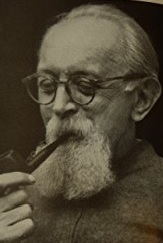Monsignore Dr. Emanuel Johannes Reichenberger

Personalia
Born:
Died:
Profession:
Persecution:
Escape from the National Socialists in 1939
Memberships
Curriculum Vitae
Emanuel (sometimes also Emmanuel) Johannes Reichenberger graduated from grammar school in Amberg and then began studying theology at the Royal Bavarian Lyceum in Regensburg (after 1918 Philosophical-Theological College) with the intention of becoming a priest. Due to the shortage of priests, he moved to Bohemia to the philosophical-theological house school in Litomerice. He was ordained a priest there in 1912 and then became chaplain in Röchlitz (Rochlice), which now belonged to Reichenberg (Liberec).
Even before the First World War, Emanuel Reichenberger was involved in the Catholic People's Association, founded in 1910, where Richard Schmitz was director of the Vienna central office. After the war, in August 1919, he played a key role in the founding of the "Volksbund der deutschen Katholiken in Böhmen", based in Reichenberg. As in Austria, the Volksbund was the central organization of Catholicism and therefore a key pillar of political Catholicism.
Emanuel Reichenberger became Director General of the Catholic Volksbund in Czechoslovakia, which had just been founded, and was thus the counterpart there to Jakob Fried in Austria. He is also involved in social issues and social policy, which is why he is also known as the "red chaplain". He also advocated reconciliation between Germans and Czechs and called for cooperation between German and Czech Catholics in 1931. He was also a staunch opponent of Konrad Henlein's crypto-national socialist Sudeten German Party.
We are on the edge of the abyss. An unrestrained campaign of hatred has claimed its first victims. I speak as a German who loves his people and his homeland and who wants to protect them from destruction. [...] Sudeten German men and women: Remember your responsibility before God, your homeland and our people.
When the Munich Agreement led to the Sudeten territories being ceded at the beginning of October 1938, Emanuel Reichenberger moved to the rest of Czechoslovakia and then emigrated to France. From there he moved to Great Britain in the summer of 1939, where he took care of Sudeten German refugees. In 1940, he went to the USA, where he was also active in pastoral work ("Father Emanuel Reichenberger"). Among other things, he is president of the Kolping Family in Chicago. From August 1944, he was also Vice President of the Democratic Sudeten Committee. In Germany, however, he was placed on the special wanted list by the Reich Main Security Office in the spring of 1940. In the USA, he moved to the diocese of Rapid City (South Dakota), where he remained a diocesan priest until his death.
In April 1945, Emanuel Reichenberger traveled with the US Army to the German settlement area of Czechoslovakia, where he documented the abuses and crimes committed in the course of the expulsion of the Germans. However, he soon had to leave Czechoslovakia and first returned to the USA, where he then lived in Chicago and helped organize the "Care Package Campaign" from there. He moved back to Europe at the end of the 1940s, initially to organize aid campaigns for Sudeten German refugees from Bavaria and to write ("Father of the Expellees"). In this context, he also opposed the theory of German collective guilt and denounced the forced expulsion of Germans from Czechoslovakia. He was criticized for this.
Emanuel Reichenberger moved to Graz around 1950, from where he worked and where the university's Faculty of Theology awarded him an honorary doctorate in 1952.
Emanuel Reichenberger moved to Vienna in 1956, where he lived until his death, campaigning for the Sudeten Germans and working as a pastor for displaced persons. Pope John XXIII appoints him Papal Secret Chamberlain (Msgr.). He is made an honorary citizen of Amberg and Vilseck, and a street is named after him in Amberg.
Places
Residence:
Citations
Biolex des ÖCV unter www.oecv.at/biolex; Stand: 11.10.2022.
